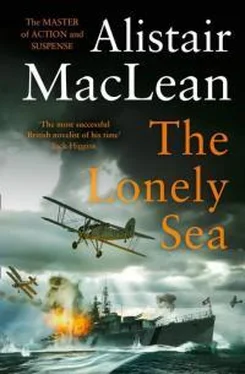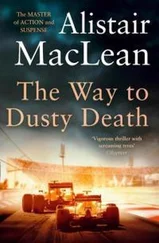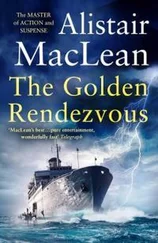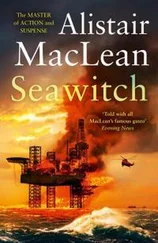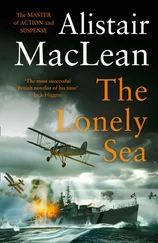‘I don’t like it.’ I could hear Glass’s teeth biting hard on his pipe stem, and his voice was kind of savage and quiet at the same time. ‘I don’t like it at all.’
‘What you mean is you don’t like them.’ I knew how old Duncan Glass felt about Mairi – since her parents had been killed his 11-year-old granddaughter was the only person he had left in the world – but I felt he was being a bit hard. ‘Why don’t you be honest about it, Duncan?’
‘Can you blame me?’ he said angrily.
‘No more than I blame any of the others. You’re just as bad as they are. Forty-five years in the city of London, and you’re still a West Coaster at heart. The Tallons are East Coasters. Oil and water never did mix.’
Glass growled deep in his throat, but I held up my hand.
‘And you’re just as nosy as the others. The Tallons are mysterious, and you don’t like mystery. But if they care to sail through the Caledonian Canal and change the Jeannie ’s registration marks in Skye so that they don’t know where they come from, surely that’s their business. It’s certainly none of ours.’
‘You talk like an East Coaster yourself,’ Glass said sourly. ‘Admit it man, they’re a close, standoffish couple.’
I admitted nothing. I knew he was wrong, but I knew I couldn’t convince him. I knew, too, what really rankled with Lord Glass and the others…
The Tallons were far and away the best fishermen in Inverglas. Only six months in the village and already they caught more every day than any two other boats out together, more than men who had fished these sounds and banks all their lives. It was natural, I suppose, that the men should resent that, the seven other skippers who sailed Lord Glass’s boats on a profit-sharing basis. It was natural that they should stand around on the quay, sullen and morose, after a poor day’s haul, while the spotted olive green and white of cod, the silver blue of mackerel spilled from the Jeannie ’s overflowing baskets as they were hoisted up for weighing.
However, I couldn’t very well say this to Glass, and I knew he thought I’d nothing more to say in their defence. He changed the conversation, slightly.
‘Mairi’s down here pretty often, isn’t she?’
‘As often as the boats are in. Otherwise she’s usually over by Sunda Bay. Always painting. A very gifted young lassie you’ve got there, Duncan.’
‘She’s all that.’ Lord Glass permitted himself a proud smile, then remembered what he was about. ‘She sees young Tallon quite often, eh?’
‘Now and again.’ I was feeling uncomfortable. ‘When he’s not working.’
‘No idea what they talk about?’
‘As a matter of fact, I have.’ I was on better ground here. ‘Always about painting. Heard the two of them at it the other day. Young Tallon was telling her how important it was that she should always see – see lines and depths and shadow and above all colour. He was pointing out a particular part of the village or harbour or sea or sky and asking her to describe it for him – just to find out how much she saw, and how much she didn’t. I’m sure he helps her.’
‘What the devil does he know about painting?’ Glass snorted. ‘Ignorant young lout who’s never…’
‘How the devil do you know…’ I started angrily, but Glass recognized the signs from 60 long years ago.
‘Sorry, Tom, sorry: let’s not fight about it. But I still don’t like it. It’s gone far enough. I’m going to stop it.’
‘Mairi’s safer here than in Sunda Bay. If the tide…’
‘MacArthur’ – that was his chauffeur – ‘is always with her. She’ll come to no harm. See you next week, Tom.’
After he’d gone – and taken Mairi with him – I got to thinking about the Tallons. They were a queer pair all right, father and son. Always they were together, John Tallon with his broad shoulders and grey beard and the useless leg swinging between the crutches, and his son, Michael, half a head again taller than his father, with long blond straight hair and a queer faraway look in the washed-out blue of his eyes.
Always they were together – always. It didn’t matter whether they were out fishing, or mending lines, or getting bait or just digging in the kitchen garden behind the little cottage they had rented on the hill, they were as inseparable as Siamese twins. They worked like Trojans, almost inhumanly hard, kept themselves strictly to themselves – and were the most disliked folk in town. Until, that is, the night of the Black Storm.
The Black Storm. It came in the early evening of the day of the Glasgow Fair, in July, and Inverglas was a ghost town for the night. It was the big day of the year in Dalbreath, seven or eight miles away across the bay – gala fete, sideshows, and a dance that lasted far into the morning. Every person who could be there was there.
But not everybody had gone – not quite. I stayed in my harbour office, because the weather forecast had been a bad and bitter one – Force 9 winds with gale seas and thunder – and I had to be there, all the time, in case some ship in distress might be looking for help or shelter.
And the Tallons were there, too – it didn’t need any clairvoyant to know that they wouldn’t be in Dalbreath. It wasn’t just that they knew that they weren’t wanted there: the Tallons never spent any money on amusement, and not a ha’penny more on drink – and everybody knew you couldn’t enjoy a good old-time dance without a dram or two in the right place. Come to think of it, I don’t suppose that helped their popularity any – West Highland fishermen tend to look a bit askance at a man too mean to put his hand in his pocket for a drink.
The Tallons had just finished pumping out the Jeannie when the rain started. It didn’t just rain – the black skies opened and it came down in pailfuls.
At once the two men turned up their collars and hurried up the quay as fast as old John could hobble, but that wasn’t very fast. I slid open the door of the office as they stumbled by and shouted on them to come in.
They were glad enough to come, I can tell you. As I closed the door behind them, old John sunk into a chair and let his breath go in a long gasp.
‘Thank you, Mr Burnett, thank you.’ He looked out at the sky, already dark almost as a tomb, and shook his head. ‘It’s going to be a wild night.’
‘It’s going to be all that.’ I nodded at the stove. ‘Just brewed a pot of tea. Plenty for three.’
John Tallon hesitated, then smiled. ‘It’s very kind of you, Mr Burnett.’
But we never had that cup of tea. I was just about to pour it when the door crashed open and there was Lord Glass himself, his face wild, grey with exhaustion and his breath coming in great heaving gasps.
‘Where are all the men, Tom, the fishermen?’ It took him three long breaths to jerk this out. ‘I can’t see…’
‘They’re all over at Dalbreath, Duncan. You know that. Fair Friday. What in the name of God…’ I broke off suddenly, because I already knew. ‘Mairi?’
‘Aye.’ He nodded heavily, his face sunk in his hands.
‘Sunda Bay?’
He nodded again, said nothing.
‘And the tide making more than half already!’ I could feel the cold horror in my blood. ‘But MacArthur, the man who looked after her…’
‘Gone to Dalbreath, and never a word to me,’ The spirit was back for a moment, the voice savage. ‘When I see him again…’ He left the sentence unfinished.
‘You’re sure she’s there?’
‘I know. When the storm came on, I looked for her. Couldn’t find her. Drove to Sunda, saw her pony there.’ His fists were clenched, his chest still heaving. ‘I ran down the cliff path – but it was too late. The beach is cut off already and the water wild.’
Читать дальше
